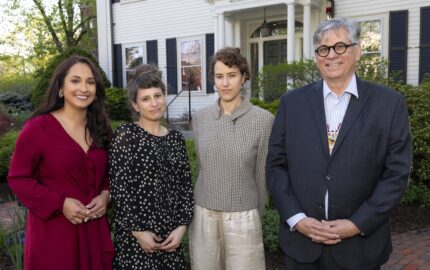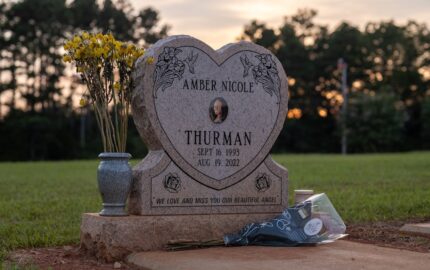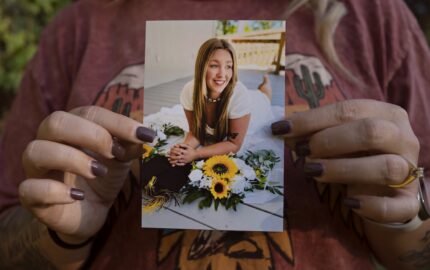The Miami Herald’s meticulously researched and reported “Innocents Lost” series, which examines the deaths of hundreds of children in Florida, has won the 2014 Worth Bingham Prize for Investigative Journalism.
The Herald’s I-Team explored how 477 children died over a six year period, victims not only of abusive or neglectful caregivers but of a flawed Florida child welfare system. The deaths occurred as Florida reduced the number of children in foster care at the same time it cut services for troubled families.
The series was the result of a year’s worth of reporting and multiple lawsuits to obtain state death records. The Herald documented how the state repeatedly left children with violent or drug-addicted caregivers, who were asked to sign unenforceable “safety plans.” The newspaper also reported on efforts by Florida’s Department of Children & Families and the Department of Health to manipulate child fatality data and to block the state’s release of the details of child deaths.
Lead reporters were staff writers Carol Marbin Miller and Audra D.S. Burch. Other Herald staffers who contributed to the series were Tallahassee bureau chief Mary Ellen Klas; data visualization specialist Lazaro Gamio; photographer and videographer Emily Michot; artist/page designer Ana Lense Larrauri and page designer Kara Dapena.
After the publication of the series, the reporters continued to update their online database, which now includes the stories of about 535 young victims. The Herald also hosted a town hall meeting to allow stakeholders, including judges, social workers, parents and teachers, to discuss their concerns.
The Herald’s reports have led to a number of important reforms to state law and policy: The Florida Legislature allocated nearly $50 million to improve child protection services and began the most comprehensive revision of child welfare statutes in its history. Lawmakers also required the child welfare agency to build and maintain a transparency website that lists all child deaths in the state. Additionally, a law established a child welfare institute at Florida State University’s social work department to offer guidance on policy and practice, and created a Critical Incident Rapid Response Team to quickly investigate child deaths.
Prosecutors also charged child welfare caseworkers with felonies for their roles leading to the deaths of two children whose stories were highlighted in the Herald.
Bingham judge Deborah Nelson said: “This series is powerful. Powerful statistics, powerful examples, powerful writing. And that’s what it takes to move government to protect its most vulnerable citizens — and move they did with significant changes in law and policy.”
Lisa Chedekel, another Bingham judge added: “Many media outlets have taken on lapses in child welfare systems in recent years, but the Herald’s look at the consequences of the “family preservation” movement is unprecedented in both depth and scope…The series is a perfect blend of data and people, showing the consequences of the broken system in both compelling narratives and a wrenchingly detailed database on every child death.”
The $20,000 Bingham Prize will be presented to The Miami Herald on May 7, 2015, at the Nieman Foundation for Journalism at Harvard University in Cambridge, Mass.
A panel of eight journalists judged the more than 100 Bingham submissions received this year: Lisa Chedekel, senior writer and co-founder of the Connecticut Health Investigative Team (C-HIT) and winner of the 2006 Bingham Prize; Cynthia Hubert and Phillip Reese, reporters at The Sacramento Bee and winners of the 2013 Bingham Prize: James Neff, investigations editor at The Seattle Times who edited the series that won the 2010 Bingham Prize; Deborah Nelson, associate professor of journalism at University of Maryland’s Philip Merrill College of Journalism; Jacqueline Petchel, executive editor of the Carnegie-Knight News21 multimedia investigative reporting initiative at Arizona State University; Jim Schaefer, an investigative reporter/columnist at the Detroit Free Press and winner of the 2008 Bingham Prize; and Stuart Watson, an investigative reporter based in in Charlotte, N.C. and a 2008 Nieman Fellow.
The Worth Bingham Prize honors investigative reporting of stories of national significance where the public interest is being ill-served. Worth Bingham, who died at the age of 34, achieved prominence as an investigative journalist and was vice president and assistant to the publisher for the Louisville Courier-Journal. His family and friends created the prize in his memory in 1967. He was a 1954 Harvard University graduate.
The Nieman Foundation for Journalism at Harvard educates leaders in journalism and elevates the standards of the profession through special programs that convene scholars and experts in all fields. More than 1,400 journalists from 93 countries have been awarded Nieman Fellowships since 1938. The foundation’s other initiatives include Nieman Reports, a quarterly print and online magazine that covers thought leadership in journalism; the Nieman Journalism Lab, a website that reports on the future of news, innovation and best practices in the digital media age; and Nieman Storyboard, a website that showcases exceptional narrative journalism and explores the future of nonfiction storytelling.
The Herald’s I-Team explored how 477 children died over a six year period, victims not only of abusive or neglectful caregivers but of a flawed Florida child welfare system. The deaths occurred as Florida reduced the number of children in foster care at the same time it cut services for troubled families.
The series was the result of a year’s worth of reporting and multiple lawsuits to obtain state death records. The Herald documented how the state repeatedly left children with violent or drug-addicted caregivers, who were asked to sign unenforceable “safety plans.” The newspaper also reported on efforts by Florida’s Department of Children & Families and the Department of Health to manipulate child fatality data and to block the state’s release of the details of child deaths.
Lead reporters were staff writers Carol Marbin Miller and Audra D.S. Burch. Other Herald staffers who contributed to the series were Tallahassee bureau chief Mary Ellen Klas; data visualization specialist Lazaro Gamio; photographer and videographer Emily Michot; artist/page designer Ana Lense Larrauri and page designer Kara Dapena.
After the publication of the series, the reporters continued to update their online database, which now includes the stories of about 535 young victims. The Herald also hosted a town hall meeting to allow stakeholders, including judges, social workers, parents and teachers, to discuss their concerns.
The Herald’s reports have led to a number of important reforms to state law and policy: The Florida Legislature allocated nearly $50 million to improve child protection services and began the most comprehensive revision of child welfare statutes in its history. Lawmakers also required the child welfare agency to build and maintain a transparency website that lists all child deaths in the state. Additionally, a law established a child welfare institute at Florida State University’s social work department to offer guidance on policy and practice, and created a Critical Incident Rapid Response Team to quickly investigate child deaths.
Prosecutors also charged child welfare caseworkers with felonies for their roles leading to the deaths of two children whose stories were highlighted in the Herald.
Bingham judge Deborah Nelson said: “This series is powerful. Powerful statistics, powerful examples, powerful writing. And that’s what it takes to move government to protect its most vulnerable citizens — and move they did with significant changes in law and policy.”
Lisa Chedekel, another Bingham judge added: “Many media outlets have taken on lapses in child welfare systems in recent years, but the Herald’s look at the consequences of the “family preservation” movement is unprecedented in both depth and scope…The series is a perfect blend of data and people, showing the consequences of the broken system in both compelling narratives and a wrenchingly detailed database on every child death.”
The $20,000 Bingham Prize will be presented to The Miami Herald on May 7, 2015, at the Nieman Foundation for Journalism at Harvard University in Cambridge, Mass.
A panel of eight journalists judged the more than 100 Bingham submissions received this year: Lisa Chedekel, senior writer and co-founder of the Connecticut Health Investigative Team (C-HIT) and winner of the 2006 Bingham Prize; Cynthia Hubert and Phillip Reese, reporters at The Sacramento Bee and winners of the 2013 Bingham Prize: James Neff, investigations editor at The Seattle Times who edited the series that won the 2010 Bingham Prize; Deborah Nelson, associate professor of journalism at University of Maryland’s Philip Merrill College of Journalism; Jacqueline Petchel, executive editor of the Carnegie-Knight News21 multimedia investigative reporting initiative at Arizona State University; Jim Schaefer, an investigative reporter/columnist at the Detroit Free Press and winner of the 2008 Bingham Prize; and Stuart Watson, an investigative reporter based in in Charlotte, N.C. and a 2008 Nieman Fellow.
The Worth Bingham Prize honors investigative reporting of stories of national significance where the public interest is being ill-served. Worth Bingham, who died at the age of 34, achieved prominence as an investigative journalist and was vice president and assistant to the publisher for the Louisville Courier-Journal. His family and friends created the prize in his memory in 1967. He was a 1954 Harvard University graduate.
The Nieman Foundation for Journalism at Harvard educates leaders in journalism and elevates the standards of the profession through special programs that convene scholars and experts in all fields. More than 1,400 journalists from 93 countries have been awarded Nieman Fellowships since 1938. The foundation’s other initiatives include Nieman Reports, a quarterly print and online magazine that covers thought leadership in journalism; the Nieman Journalism Lab, a website that reports on the future of news, innovation and best practices in the digital media age; and Nieman Storyboard, a website that showcases exceptional narrative journalism and explores the future of nonfiction storytelling.


